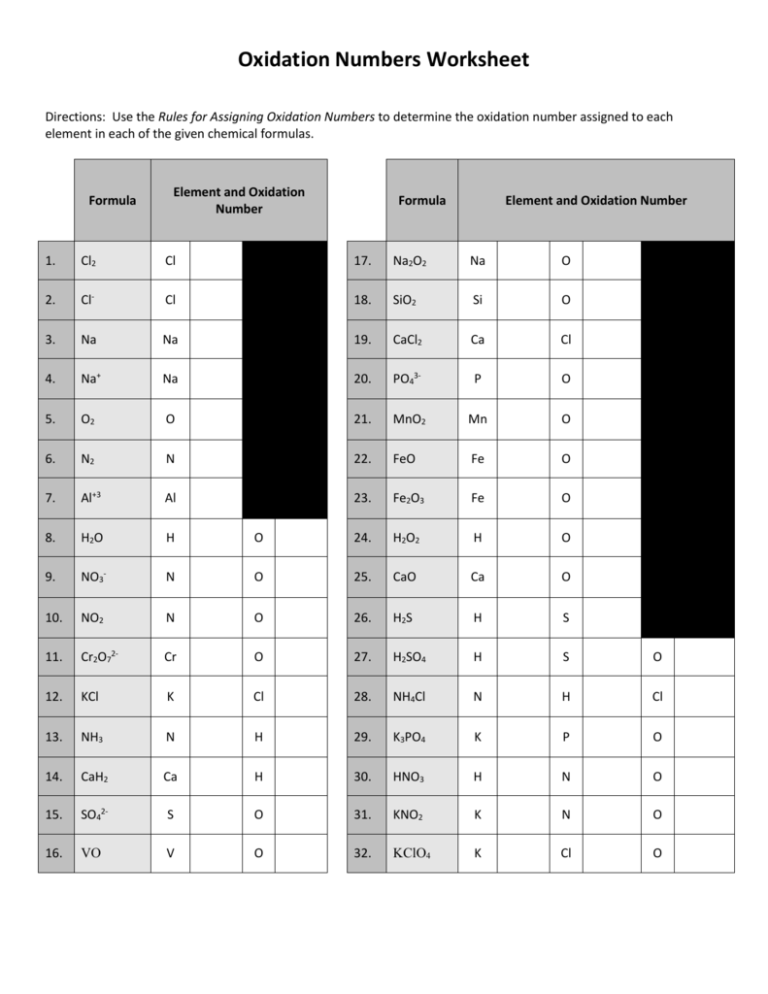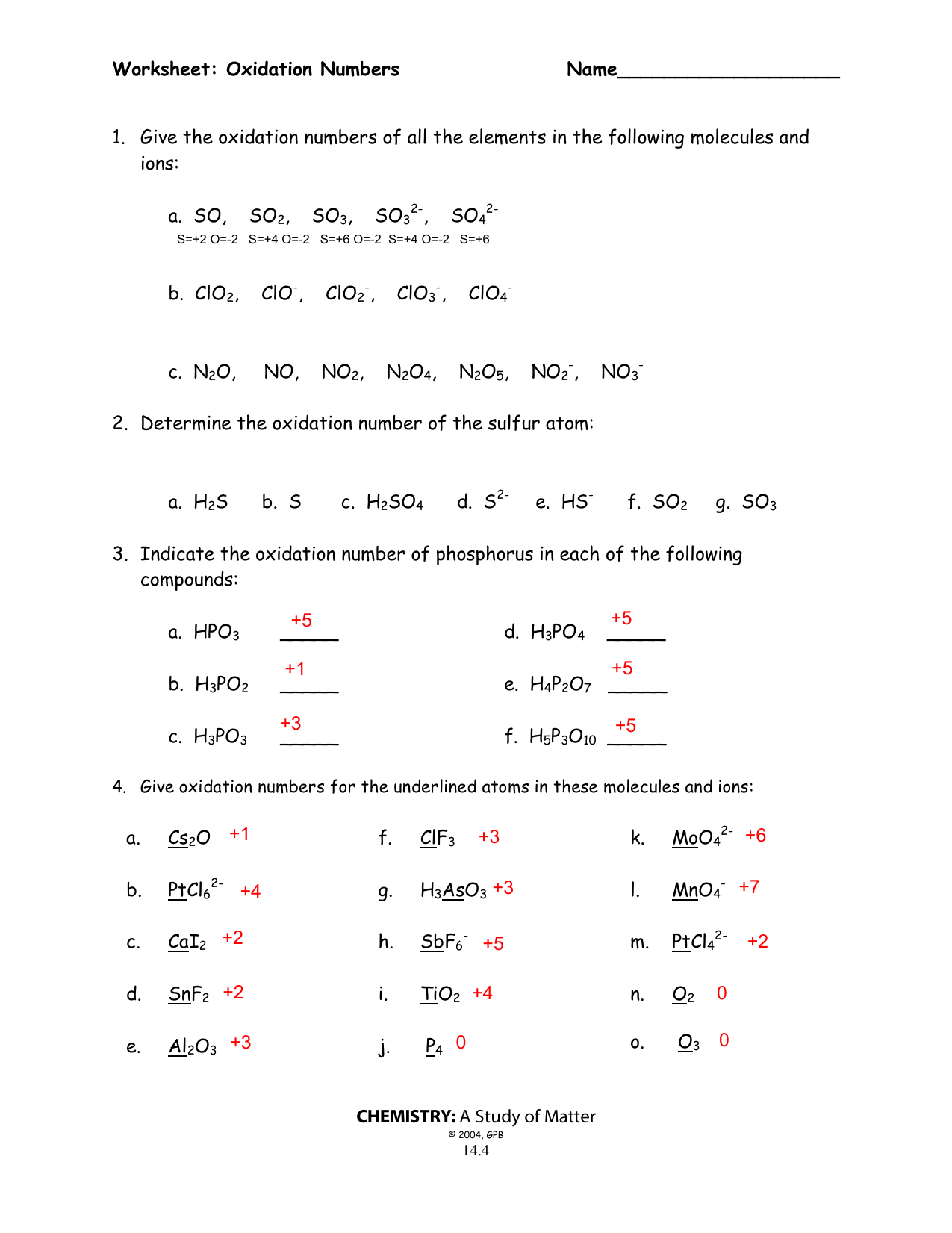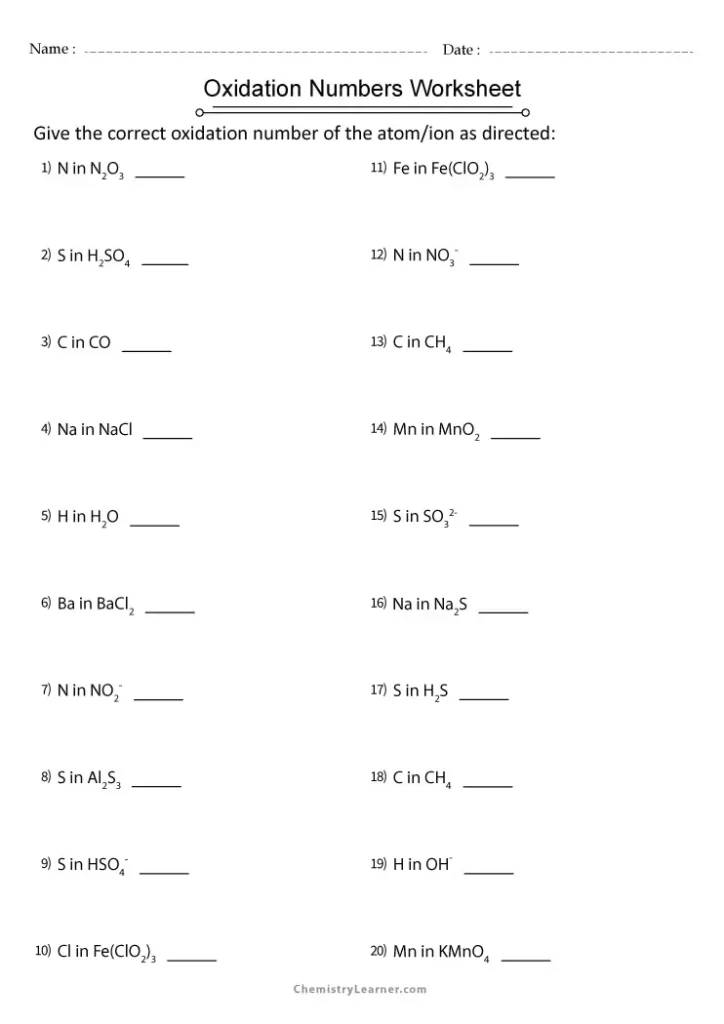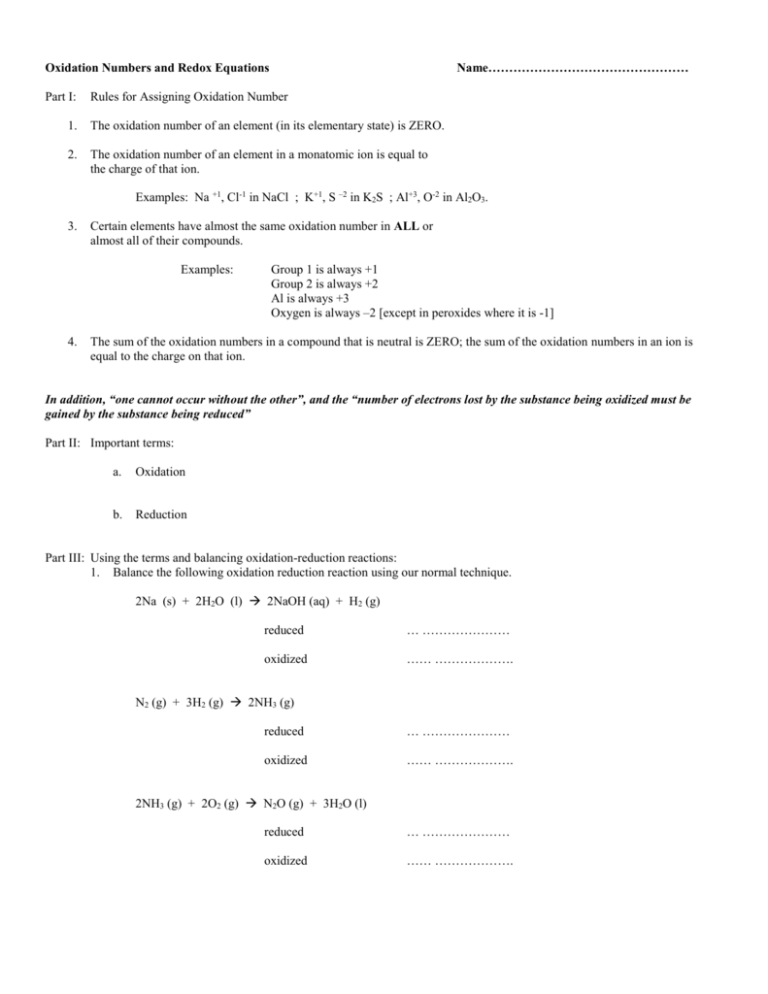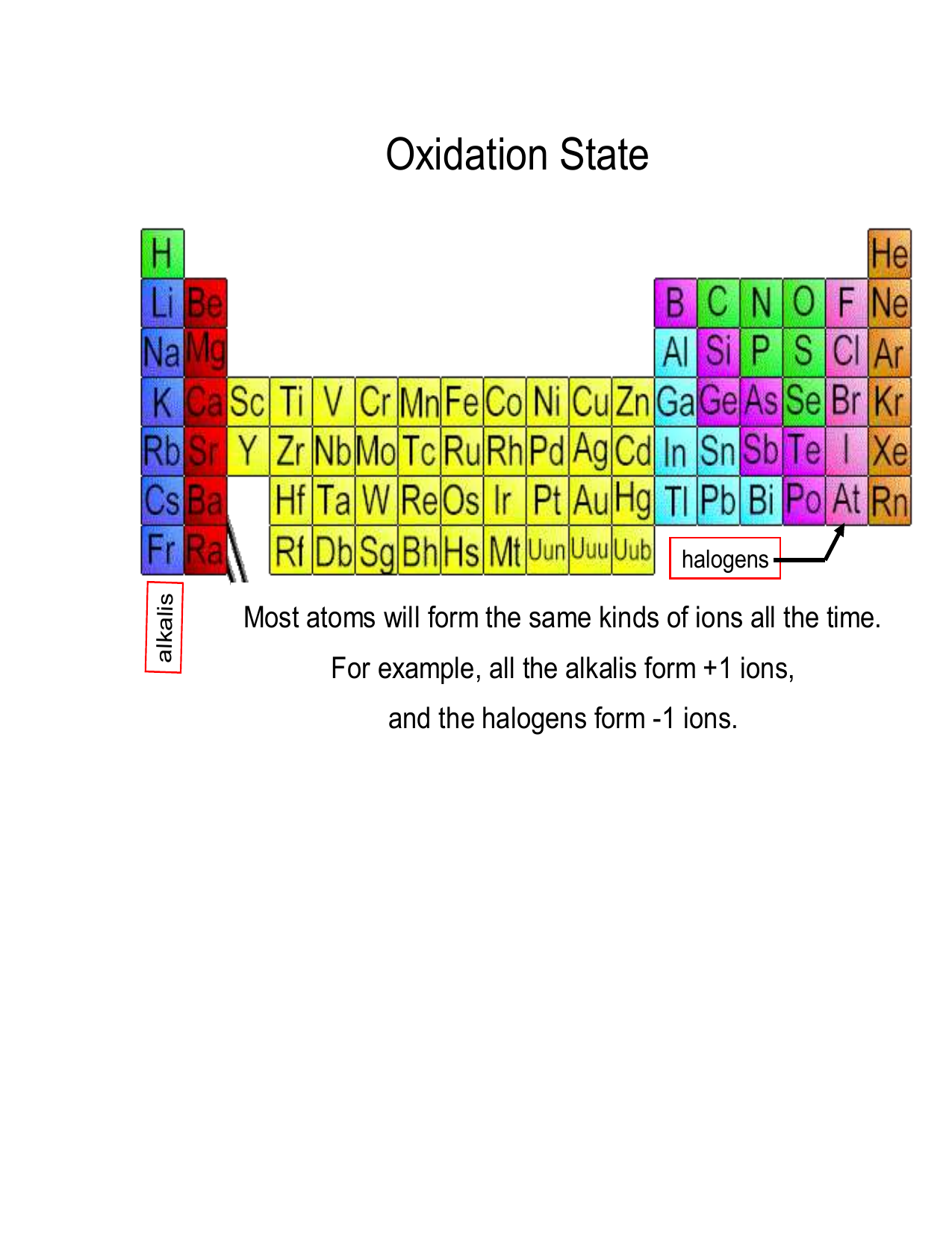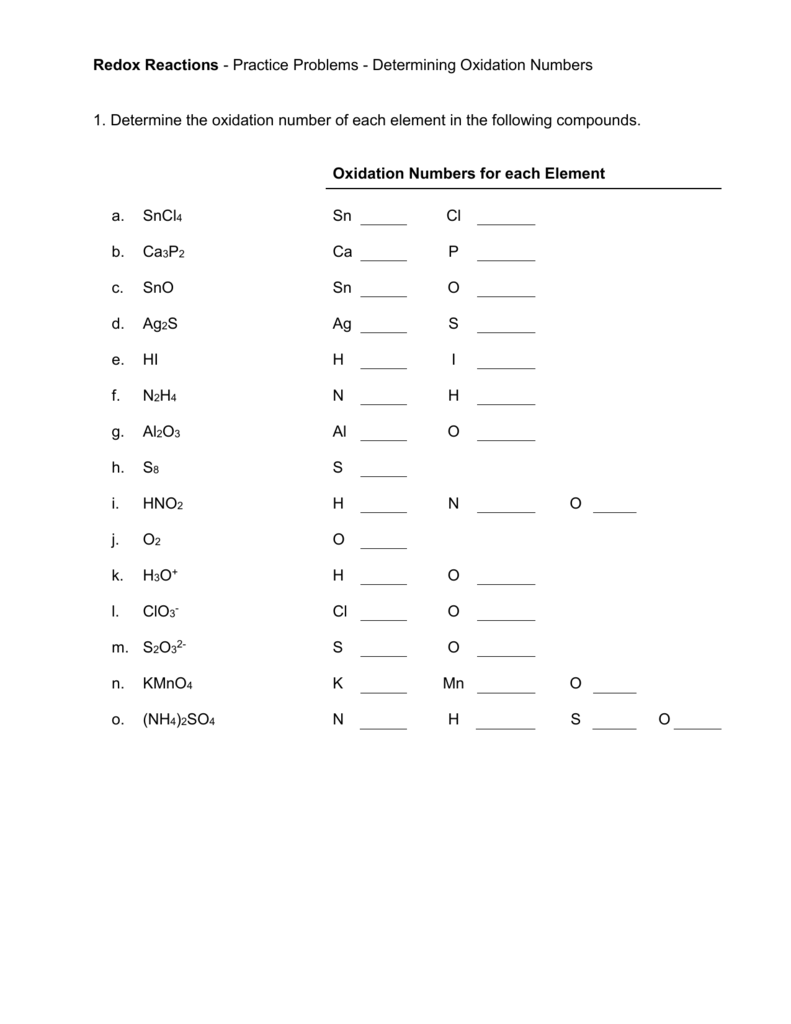Worksheet Oxidation Numbers - The oxidation number of an element in a monatomic ion equals the. Working out oxidation numbers from electronegativity values, challenging redox questions and comparing the two methods of. 2) the oxidation number of a monatomic ion. Oxidation numbers are bookkeeping numbers. To determine the oxidation number of an element in a compound, use all the “known” oxidation states first by applying the above rules. A pure element has an oxidation number of 0. They mark the flow of electrons and are useful for balancing redox (reduction/oxidation). In the following questions, give the oxidation number of the indicated atoms/ion. Oxidation numbers worksheet the oxidation number of an atom is the apparent charge assigned to it in a particular molecule, ion or. Rules for assigning oxidation numbers 1) the oxidation number of any uncombined element is 0.
To determine the oxidation number of an element in a compound, use all the “known” oxidation states first by applying the above rules. In the following questions, give the oxidation number of the indicated atoms/ion. A pure element has an oxidation number of 0. Oxidation numbers worksheet the oxidation number of an atom is the apparent charge assigned to it in a particular molecule, ion or. Working out oxidation numbers from electronegativity values, challenging redox questions and comparing the two methods of. 2) the oxidation number of a monatomic ion. Oxidation numbers are bookkeeping numbers. Rules for assigning oxidation numbers 1) the oxidation number of any uncombined element is 0. The oxidation number of an element in a monatomic ion equals the. They mark the flow of electrons and are useful for balancing redox (reduction/oxidation).
They mark the flow of electrons and are useful for balancing redox (reduction/oxidation). In the following questions, give the oxidation number of the indicated atoms/ion. A pure element has an oxidation number of 0. To determine the oxidation number of an element in a compound, use all the “known” oxidation states first by applying the above rules. The oxidation number of an element in a monatomic ion equals the. Oxidation numbers worksheet the oxidation number of an atom is the apparent charge assigned to it in a particular molecule, ion or. Oxidation numbers are bookkeeping numbers. Rules for assigning oxidation numbers 1) the oxidation number of any uncombined element is 0. Working out oxidation numbers from electronegativity values, challenging redox questions and comparing the two methods of. 2) the oxidation number of a monatomic ion.
Free Collection of Assigning Oxidation Numbers Worksheets
Working out oxidation numbers from electronegativity values, challenging redox questions and comparing the two methods of. Oxidation numbers worksheet the oxidation number of an atom is the apparent charge assigned to it in a particular molecule, ion or. 2) the oxidation number of a monatomic ion. Rules for assigning oxidation numbers 1) the oxidation number of any uncombined element is.
Oxidation Numbers Worksheet fill in the blank
A pure element has an oxidation number of 0. Oxidation numbers are bookkeeping numbers. Oxidation numbers worksheet the oxidation number of an atom is the apparent charge assigned to it in a particular molecule, ion or. The oxidation number of an element in a monatomic ion equals the. Rules for assigning oxidation numbers 1) the oxidation number of any uncombined.
Worksheet Oxidation Numbers Answer Key
The oxidation number of an element in a monatomic ion equals the. In the following questions, give the oxidation number of the indicated atoms/ion. Oxidation numbers are bookkeeping numbers. To determine the oxidation number of an element in a compound, use all the “known” oxidation states first by applying the above rules. A pure element has an oxidation number of.
Free Printable Oxidation Numbers Worksheets
They mark the flow of electrons and are useful for balancing redox (reduction/oxidation). Oxidation numbers worksheet the oxidation number of an atom is the apparent charge assigned to it in a particular molecule, ion or. Rules for assigning oxidation numbers 1) the oxidation number of any uncombined element is 0. In the following questions, give the oxidation number of the.
Free Printable Oxidation Numbers Worksheets Worksheets Library
2) the oxidation number of a monatomic ion. Oxidation numbers worksheet the oxidation number of an atom is the apparent charge assigned to it in a particular molecule, ion or. To determine the oxidation number of an element in a compound, use all the “known” oxidation states first by applying the above rules. They mark the flow of electrons and.
With this ColourbyNumber worksheet, chemistry or science students can
Oxidation numbers are bookkeeping numbers. In the following questions, give the oxidation number of the indicated atoms/ion. They mark the flow of electrons and are useful for balancing redox (reduction/oxidation). To determine the oxidation number of an element in a compound, use all the “known” oxidation states first by applying the above rules. A pure element has an oxidation number.
Oxidation Numbers Worksheet
In the following questions, give the oxidation number of the indicated atoms/ion. Oxidation numbers worksheet the oxidation number of an atom is the apparent charge assigned to it in a particular molecule, ion or. Rules for assigning oxidation numbers 1) the oxidation number of any uncombined element is 0. Working out oxidation numbers from electronegativity values, challenging redox questions and.
Assigning Oxidation Numbers Worksheet 1 Free Worksheets Printable
Oxidation numbers are bookkeeping numbers. A pure element has an oxidation number of 0. 2) the oxidation number of a monatomic ion. To determine the oxidation number of an element in a compound, use all the “known” oxidation states first by applying the above rules. They mark the flow of electrons and are useful for balancing redox (reduction/oxidation).
Free Printable Oxidation Numbers Worksheets Worksheets Library
2) the oxidation number of a monatomic ion. Working out oxidation numbers from electronegativity values, challenging redox questions and comparing the two methods of. The oxidation number of an element in a monatomic ion equals the. To determine the oxidation number of an element in a compound, use all the “known” oxidation states first by applying the above rules. They.
07 Finding Oxidation Numbers Worksheet
In the following questions, give the oxidation number of the indicated atoms/ion. Working out oxidation numbers from electronegativity values, challenging redox questions and comparing the two methods of. Oxidation numbers worksheet the oxidation number of an atom is the apparent charge assigned to it in a particular molecule, ion or. 2) the oxidation number of a monatomic ion. They mark.
Oxidation Numbers Worksheet The Oxidation Number Of An Atom Is The Apparent Charge Assigned To It In A Particular Molecule, Ion Or.
2) the oxidation number of a monatomic ion. Oxidation numbers are bookkeeping numbers. The oxidation number of an element in a monatomic ion equals the. They mark the flow of electrons and are useful for balancing redox (reduction/oxidation).
Rules For Assigning Oxidation Numbers 1) The Oxidation Number Of Any Uncombined Element Is 0.
Working out oxidation numbers from electronegativity values, challenging redox questions and comparing the two methods of. To determine the oxidation number of an element in a compound, use all the “known” oxidation states first by applying the above rules. A pure element has an oxidation number of 0. In the following questions, give the oxidation number of the indicated atoms/ion.

